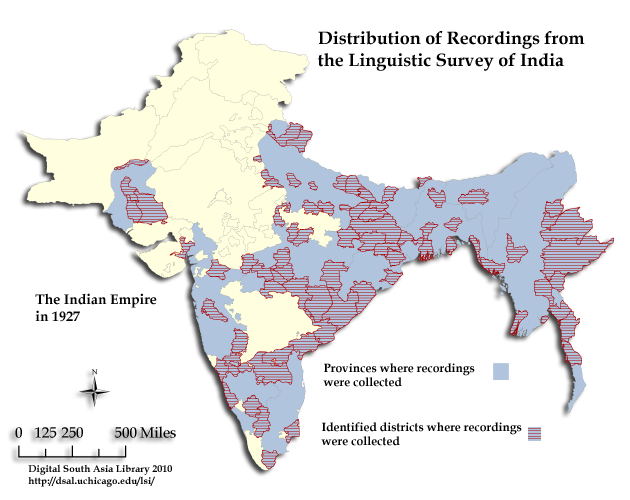George Grierson pioneered the vast Linguistic Survey of India in 1894, an immensely useful resource for anyone working on languages of the Indian subcontinent. A set of recordings were also made as part of the survey, which were recently uncovered in the British Library. These recordings are now freely available from the University of Chicago's Digital South Asian Library at http://dsal.uchicago.edu/lsi/
In order that the languages might be more easily compared (and because "it contains the three personal pronouns, most of the cases found in the declension of nouns, and the present, past, and future tenses of the verb"), Grierson chose to use translations of the Biblical "Parable of the prodigal son", and many of the recordings are of speakers reciting this parable in their native language.
Here is the recording of the "Parable of the prodigal son":
In Hindi (one of the major languages of India)
In Khasi (a Mon-Khmer language spoken in Shillong, Meghayala, [the former capital of Assam])
OPEN Magazine has a great article about these recordings, their rediscovery and content, available here: Voices from Colonial India
It's well worth a read, but here are a few highlights. For instance:
Some of the Sanskrit recording took a bit of doings. Background: strict followers of the Vedic/Hindu tradition are supposed to safeguard the Vedas from the ears of those who are not dvijas ("twice-born", those who wear the sacred thread). This prohibition was taken seriously by some authorities, for instance, in the Gautama Dharma Sutra we find:
अथ हास्य वेदमुपशृणवतस्त्रपुजतुभ्यांश्रोत्रप्रतिपूरणमुदाहरणे जिह्वाच्छेदो धारणेशरीरभेदः
"Now if he [a Shudra = a non-dvija/untouchable] listens intentionally to (a recitation of) the Veda, his ears shall be filled with (molten) tin or lac. [Gautama Dharma Sutra 12.4]
From the OPEN Magazine article:
...All of this, of course, could not have been accomplished without some Brahminical drama. The scholar Ganganath Jha, who was approached for the Sanskrit reading, was scandalised to learn that a mlechha [Sanskrit for "barbarian", "foreign devil", and thus by definition a non-dvija] would be privy to his chaste Sanskrit. A demand was made for a certifiably Brahmin gramophone operator. The Raj, almost as unbending as Brahmins, refused. A compromise was reached: Jha sat in a room and spoke into a large horn-like object that projected his voice into another room where the operator sat. Communication between the two was by means of a complicated system of switches to ensure that the operator didn’t physically hear the Sanskrit. And that was enough to assuage the Brahmin guilt about speaking Sanskrit into a device that held the power to broadcast it to the world...
Jha's recording must have been of some Vedic text, because I am unaware of any general prohibition against speaking Sanskrit in the presence of non-dvijas. Sadly, I cannot find this recording on the University of Chicago's Digital South Asian Library site (they do have a general entry for Jha here: https://coral.uchicago.edu:8443/display/lasa/Ganganath+Jha+Ken.+Sanskrit+Vidyapith+%28Allahabad%2C+India%29).
[Brahminical rationalisations can be both amusing and creative: My advisor, who is a (German) Sanskrit scholar, once told me about one spoken Sanskrit conference he attended (where, I believe, he was the only non-Brahmin/non-Indian) at which there was one attendee who was a bit unhappy with the presence of a non-Brahmin, and was careful not to let my advisor's shadow touch him... Other attendees came up with rationalisations: German sounds a bit like Sharma, a Brahmin surname, and so they theorised that Germans are perhaps "long-lost" Brahmins, and therefore my advisor's presence could be a acceptable.]
Another interesting bit from the OPEN Magazine article:
Many of the speakers chose to sing or recite poems or limericks. Particularly lingering is the voice of Hassaina of Delhi who has clips in the Ahirwati and Mewati languages. Who was this girl who sang with such sang-froid of love and waiting on 26 April 1920? Nothing is known of her. She survives only as a voice.
Here is Hassaina's song: http://dsal.uchicago.edu/lsi/6838AK
[27 May 2011: Nepali is actually represented too, hidden under "Khaskura", including both the parable of the prodigal son translation, and a delightful song sung by a Shillongwala Nepali, Babu Dhan.]
[27 May 2011: Nepali is actually represented too, hidden under "Khaskura", including both the parable of the prodigal son translation, and a delightful song sung by a Shillongwala Nepali, Babu Dhan.]



No comments:
Post a Comment